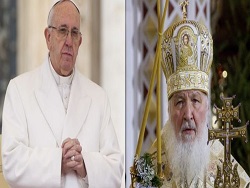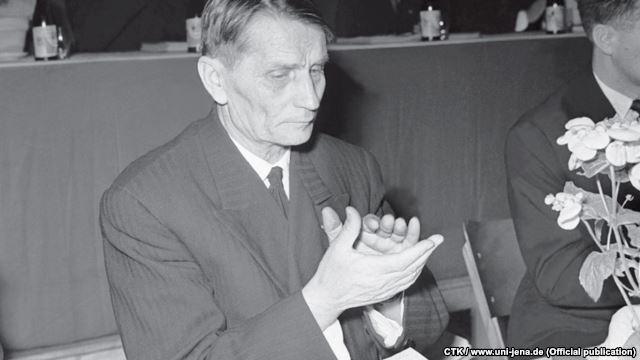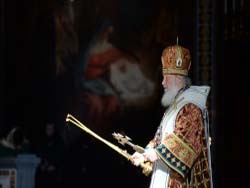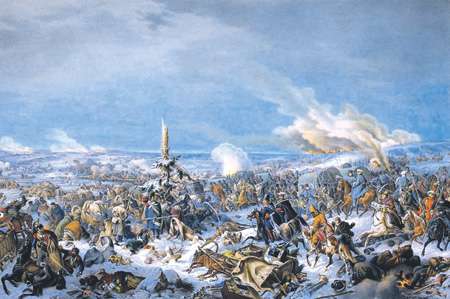For years, the controversy surrounding Stalin’s personality do not cease. Many aspects of his personality carefully hidden from the eyes of a stranger” not only Bolsheviks, but also Democrats, fell upon the head of the people “glasnost”, which turned out to be not universal but rather selective.

Among those, the information on which the ideology of “transparency” is carefully suppressed, distorted and filtered, is the question of the relationship between Stalin and the Russian Orthodox Church.
So, what do we know today about the relationship between Stalin and Orthodox, between Stalin and the Russian Orthodox Church?
In the official biography of Stalin we read: “1888 – comes in 4-classroom religious school. 1894 – graduated from the school of the 1st level. 1894 – enters the theological Seminary. 1899 – expelled from the Seminary”. .
Contrary to what was argued in encyclopedias and official biography of the leader (viewed by Stalin himself), was born I. Dzhugashvili on 6 December 1878 (not 9 Dec 1879) – the day of the widely venerated in Russia St. Nicholas the Wonderworker.Baptized it in honor of the Holy righteous Joseph the betrothed.
Classmate I. Dzhugashvili in Gori spiritual school testified:
“In the first years of study Soso was very faithful attended all the Church services, sang in the Church choir. I remember well that he did not only perform religious ceremonies but always reminded us of their observance“.
The Gori spiritual school I. Dzhugashvili graduated with honors, receiving even merit that contributed to its admission to the Tiflis theological Seminary polupansiona (with free accommodation and meals in the dining room).
The first two classes of the Seminary (1894-1896) he graduated with first grade 5 conduct peredvinuvshis for academic achievement from 8th to 5th place. The third class (1896-1897) I. Dzhugashvili ended the second category with a score of 4 on the behavior, moving from 5th to 16th place.
In the fourth grade (1897-1898) he was left for testing in the fall; the behavior he already had three, and in education, he was 20 m. Finally, in the spring of 1899 for the fifth grade exams he did not give up.
All these dramatic changes were associated with his passion for revolutionary ideas and established relationships with the crypto-Marxists. However, consensus about the reasons for his departure from theological schools is still there.
Whatever it was behind the walls of the Seminary he was when he was 20 years old.
In religious schools in total, he spent nearly eleven (!) years… of course, could not impose a mark on the rest of his life, having influenced the formation of the character and peculiarities of thinking.
Indeed, as noted by researchers, his writings and speeches, catchy and accessible the perception of the common man, was very similar to sermons, bearing indelible traces of the Church’s logic. Method of expression, the manner of his letters reminded of the message is known to Confessors. Slowness of movements – the behavior of the priest.
This should include striking style to listen to the interlocutor, the ability to call for explicit recognition; inhale when you need faith and hope. Many of his contemporaries emphasized the modesty of his clothes, household simplicity, the simplicity of food.
A big role in this choice has played a mother Yekaterina Georgievna Dzhugashvili (1860-4.6.1937).
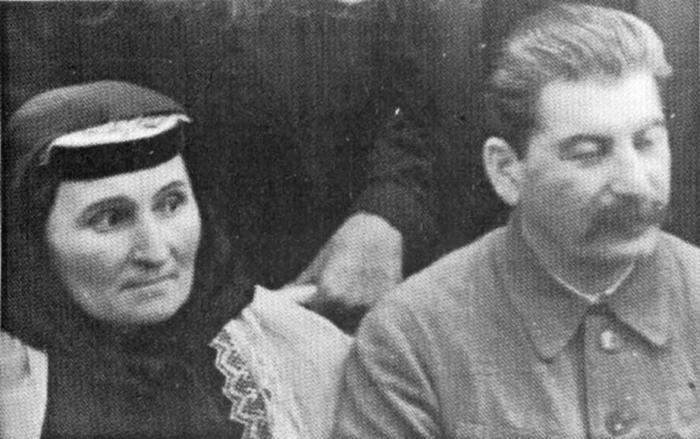
“…She barely knew how to write his name, recalled his grandmother, which came in June 1935, Stalin’s daughter , Alliluyeva, S. I.. – Her character was obviously strong and determined, and admired father. Before she was widowed and became even harsher. She had many children but all died in early childhood, only my father survived. She never wanted to leave Georgia and come to live in Moscow, although the father called her and her mom too. She did not need a capital way of life, she continued her quiet, unassuming life of a simple pious woman.
My grandmother was his principles — the principles of religious man who lived a strict, hard, honest and dignified life. Its hardness, stubbornness, her severity towards herself, her puritanical morality, its harsh masculine nature, — all this passed to my father“.
“She was very devout, “writes S. I. Alliluyeva forth, and dreamed that her son became a priest.
She remained religious till his last days and when the father visited her, shortly before her death, said to him: “A pity that you did not become a priest”… He repeated these words with admiration; he liked her disdain for what he has achieved, to earthly fame, to the hustle and bustle…“
Buried Catherine G. Davidova mountain in Tbilisi, near the Church of St. David.
According to the testimony of the nuns Sergius (Klimenko), for Stalin “were praying sharhabil Anthony (Abashidze). He was an inspector in the Seminary where Stalin studied. And when Stalin’s “leprosy” put in solitary confinement on bread and water, he took pity on him and sent him to eat. But when times changed, when Stalin became an autocrat, and he Archbishop, he wanted to arrest. And here Stalin was told: remember Prince Abashidze, who you sent to eat when you’re in a solitary sitting? And Stalin said: “do Not touch him.” And Bishop Anthony was praying for him and something he begged. So what is the fate of Stalin, we do not know, God Alone knows, but still it started with the release”.
It should be stressed that Stalin was never a proponent of the persecution of the Church, although he never shied away from the General party line in the struggle against religion (sometimes even “voicing” her), however, note developed still others.
As argued by one of his closest friends and comrades V. M. Molotov, “Stalin was a militant atheist”.
September 12, 1933, the Chairman of the OGPU V. R. Menzhinsky was addressed to “top secret” Directive signed by a “Secretary” of Stalin. It stated:
“In the period from 1920 to 1930 in Moscow and the adjacent areas completely destroyed 150 churches. 300… in a converted factory shops, clubs, dormitories, prisons, detention centers and colonies for homeless children and Teens. Plans architectural buildings include the demolition of more than 500 remaining temples and churches.
Based on the above, the Committee finds it impossible to design developments due to the destruction of temples and churches that should be regarded as monuments of ancient Russian architecture. Bodies of the Soviet government and worker-peasant militia, OGPU obliged to apply the measures (including the disciplinary and party responsibility) for the protection of monuments of ancient Russian architecture”.
Already before the war he never spoke personally with the anti-religious appeals.
About many thought-provoking and documents issued recently by priest Dimitri Dudko.
Before the war, picking up the library for summer, Stalin was credited for the information of the players: “Please, that there is no atheistic paper!”
Absolutely it is known, for example, that Stalin sometimes liked to quote the Bible. Sometimes even before the immediate environment (of course, those who did this at least in some measure) “proud” that Georgia adopted Christianity much earlier than Russia.
Molotov recalled: “all three of us were singing in the Church. Stalin, Voroshilov and me. In different places, of course. Stalin in Tbilisi, Voroshilov in Lugansk, I’m in my Nolinsk. Stalin sang fine. Voroshilov was singing. He had a good ear. Here, the three of us sang. “Let your prayer…” and so on. Very good music, singing Church”. And further: “…the Church song we sometimes sang. After lunch. Used white guard and sang. Stalin had a pleasant voice…“
Stalin continued to remember his friends at the spiritual Academy and Seminary. In a letter to his mother dated 9 October 1936 he writes: “Hello mother! You live ten thousand years! Hello to all my old friends – comrades. A whole. Your Soso“.
In the book D. volkogonova read about the order of I. V. Stalin in 1944, to expel from his personal Deputy money very large remittances to his friends at the Seminary – Peter Kopanadze, Gregory, and Michael Glurdjidze Zaraza by writing them a small note. “Grisha! Accept from me a small gift. 9.05.44. Your Soso – we read in one of them.
According to D. volkogonova, “in the personal archive of Stalin preserved nickelcontaining notes”.
“We underestimated, — said B. A. Sventsitsky, – and an open struggle of Stalin with left-wing forces that try to present a sort of innocent slain lambs. But if it had not been destroyed by these forces of the devil, would have been impossible, and “the Church rise” in the postwar years, suddenly interrupted by N. S. Khrushchev.
“All-Union elder” Mikhail Kalinin, whose Russian name Lenin tried to cover up their insane fight against the Church before his death, invited the priest, confessed and took communion.
G. M. Malenkov ended his days a Psalmist in Church.
Son Stalin Vasily immediately after the death of his father went to the rector of the Church of the Resurrection (St. Philip the Apostle) it was intended that Aksakov pereulok near the Arbat Archpriest John Suetinskoy with a request to bury a parent in absentia.
It is noteworthy that the daughter of Stalin Svetlana Alliluyeva, in the end, I came to God. In the spring of 1962, she was baptized in Moscow, Archpriest Nikolay Aleksandrovich Golubtsov (1900-1963). “And I’m happy that it happened to me, “wrote S. I. Alliluyeva.
The former head of the state security Committee Vladimir Kryuchkov in the late 90-ies were made public two documents, under which stands the signature of Stalin. The first is dated the 33rd year. It contains the order to stop the destruction of the temples that are monuments of architecture. In another document, signed in 1939, the Central Committee decides to stop the persecution of Orthodox priests and laity.
These documents were given to father Dmitri arguments for article “He was a believer“, published in 1999 in the magazine “Our contemporary”.
The question of whether Stalin was a believer, was not only the father of Demetrius.
Artyom Sergeyevbrought up in the Stalin house, recalled:”I Remember a case a year in 1931 or 32-M. Opposite the school, where he studied under Vasily, second Obydensky lane, was a temple. Once, when there was a service boy at the temple tried to shoot a cap gun. Basil in this did not participate, and told my dad about it. The father asks: “Why did they do it? They’re praying, you learn not to interfere. Why you disturb them to pray?”
Then asked Basil: “You love grandma?” He says, well, Yes, very, because this is your mother. Stalin said, “She’s praying”. Basil: “Why?” The father answers him: “Because she might know something you don’t know”.
According to the memoirs of Stalin’s bodyguard, Yuri Soloviev, Stalin, was praying in the Church in the Kremlin, who was on the way to the cinema. Yuri Solovyov himself remained outside the Church, but Stalin could see through the window.
The oldest parishioner of the Moscow Church of Apostle Philip in the Arbat LyubovIsaakovna Peterson shortly before his death this year specially invited Victor Caulkin and Valentina V. Sharov (the radio “Radonezh”) to announce that Metropolitan Nikolai (Yarushevich) professed Stalin.
L. I. Peterson and her mother were spiritual children of the Lord.Metropolitan Nicholas told them about it shortly before his imprisonment in the hospital, adding that of the hospital alive will not be released. On this edition of “the Russian Bulletin” published a message, said Victor Solkin.
According to the testimony of Stalin’s grandson A. Bordosskogo, Stalin confessed. “The priest shook under Khrushchev with terrible force, but he didn’t say anything, “claimed Burdonsky.
It is necessary to emphasize the spiritual connection between Stalin and the Orthodox Church during the great Patriotic war.
The first appeal to the Soviet people made on 3 July 1941, was:
“Comrades! Citizens! Brothers and sisters! The soldiers of our army and Navy! I am addressing you, my friends! The perfidious military attack by Hitlerite Germany on our Motherland, begun on June 22 – continued”.

There are numerous Church tradition, at least, a warning from unambiguous assessments of Stalin.
In October 1941, Stalin was in Tsaritsyno for the righteous St. Matrona(Nikonova), who said to him: “the Red rooster will win. The victory will be yours. One of the bosses you will not leave Moscow”.
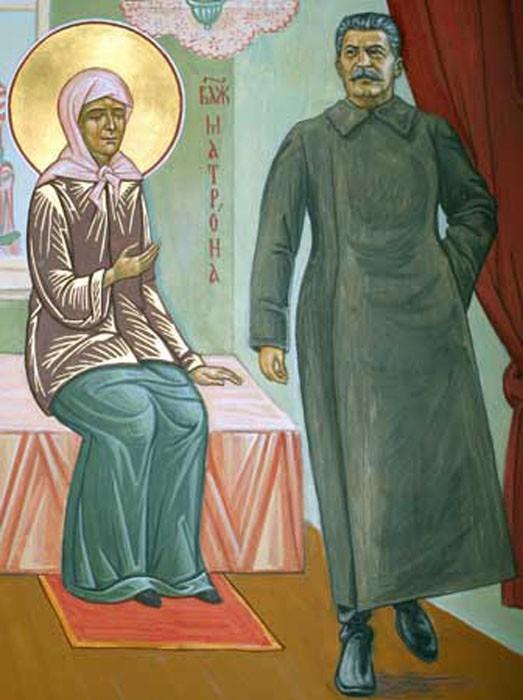
“In 1941, when the Germans were already in Khimki, recalled the nun of St. Sergius(Klimenko), is from Moscow wanted to take the relics of Holy Prince Daniel. (The relics of St. Sergius of Radonezh was already taken historical and archeological society for preservation.) On the night of November 23, old style Prince Daniel of Moscow, he was Stalin (with Stalin the night the Kremlin was lit and everything worked) and said, “I am the master of Moscow, don’t touch me, and you will be bad”.
That Stalin saw Prince Daniel, told me the Archimandrite Jeremiah (Lebedev[, 1885 -1.3.1953]), the Treasurer of Patriarch Alexy, when I after the war, came to Moscow”.
Day on August 22/September 4, 1943 at near dacha in Kuntsevo, Stalin called a meeting, which was attended by Malenkov and Beria. The meeting was attended by the KGB Colonel G. Karpov. Shortly before that on secondment of staff of the partisan detachments in the Ukraine, he was appointed head of the Department to oversee the activities of religious organizations.
After discussing some practical issues, it was decided to hold a meeting of Stalin with the hierarchy of the Church. Immediately from Stalin’s office Colonel G. Karpov called Metropolitan Sergius had agreed to the meeting.
Late in the evening of the same day the Trinity gates of the Kremlin drove a black government limousine. In it were the Patriarchal Locum Tenens, Metropolitan Sergius, Metropolitan Alexius (Simansky) and Metropolitan Nikolai (Yarushevich).
In a few minutes they were in Stalin’s office. Meet the saints came out the owner of the office…
(Recall liturgically came the next day – 23 August/5 September. Sunday. The leavetaking of the feast of the assumption of the blessed virgin. Believing heart has no doubt: it is She, the mother of God “of the Russian land the Queen of Heaven”, has adequately finished what they started people sovavsya in 1917, 15 August – the day of the assumption of Her honest – in the Blessed city of Moscow in the Dormition Cathedral – the House of the blessed virgin Mary – Consecrated Cathedral Church, to restore the Patriarchate in Russia.)
During the meeting, Stalin repeatedly stressed that “the Church can count on the full support of the government in all matters related to its organizational strengthening and development inside the Soviet Union“.

The discussions were attended by V. M. Molotov and G. G. Karpov.More recently, of this historic meeting had relatively little is known, and reported a lot of false.
Recently it became known note Karpova, they made up the next day after the meeting. Unfortunately, for obvious reasons, we have not reached any memories of saints who participated in this meeting. Perhaps some scraps from their oral memories, more or less deformed, came to us through a third party.
“At the end of the conversation, reads one of such records, the Metropolitan [Sergius] was terribly tired Stalin took the Metropolitan’s arm, gently, like a real sub-deacon, brought him down the stairs and said the followingphrase: “master! That’s all I currently can do for You”“.
September 5, 1943 “Pravda” reported: “Metropolitan Sergius brought to the attention of the Chairman of people’s Commissars that the leading circles of the Orthodox Church has the intention shortly to convene a Council of bishops to elect the Patriarch of Moscow and all Rus and education to the Patriarch of the Holy Synod. The head of the government comrade. Stalin reacted sympathetically to these proposals and stated that the government not be this obstacles.
Stalin highly praised the Patriotic role of the Church in the war and thought it necessary to encourage its activities. Then was opened the Seminary, Academy, resumed the Trinity – Sergieva Lavra, Kiev – Pechersk Lavra and many monasteries. In the Soviet press stopped anti-religious polemic.
Yes, Stalin was forced to reckon with their surroundings.In 1948, he was forced to give in to the pressure of these forces, allowing them to begin preparations of a special resolution of the Central Committee of the CPSU(b) on the tasks of atheistic propaganda in the new environment. After some time, rejecting many of the ideas of the developers, Stalin actually killed off this document.
Moreover, the official party and government documents at this time disappear the terms “anti-religious” and “atheist” work. Almost for the first time in the history of the party these notions were absent in the report of the Central Committee of the CPSU(b) of the XIX party Congress in October 1952.
According to eyewitnesses, during the war of the righteous St. Matrona (Nikonov) was often “shown in the people what is happening and what will happen.
Once said: “Who knows, maybe the Lord will forgive Stalin! He is a prisoner”.
I said, “who?”
She – “the Kaganovich and all those!”
Showed how Stalin before his death will scream: “you, you!” And one side will stand Kaganovich, and on the other side of his sister. “What you want to do with me?” And they will put a cushion on it. It was told by the Mother in 1943″.
In the victorious 1945 , Bishop Benjamin asked the lay brother had already departed Patriarch Sergius, Archimandrite Ioann (Razumov), not if he had to hear any details about that meeting in the Kremlin.
“John, “recalled the Archbishop, – did not know what they were saying. Only one remembers: Metropolitan Sergius, gate of Stalin, walks in the room and – as usual – something she thinks to herself.
And John stands at the lintel of the door, silently… Suddenly Metropolitan Sergius papoloses says:
– What he is good!.. What he is good!..
In a way he thought and talked about Stalin.
I’m talking about John And you didn’t think to ask the Lord: ‘Because he is an unbeliever’?
– Asked!- And what you said Metropolitan Sergius?
Give the exact words of Metropolitan Sergius. And he was a wise man. And the words of vain did not. Nor do I think that it could invent FR: do not invent…
Then, it is up to us to think…After I read in the third Epistle of the Apostle John, the “Apostle of love”, the following words: ”he that doeth good is of God; but he that doeth evil hath not seen God.”
Amazing! After all, it literally coincides with the words of Metropolitan Sergius!..”
“Under Stalin, the Russian Church was at the time unheard of before the status was created by the Council for Russian Orthodox Church and approved the status of commissioners. In fact, the atheist (only externally, internally, the Bolsheviks were different!), the Commissioner, an employee of the GPU or the Soviet government, doing even the appointment of priests to the parish and without his visa was even the Bishop impossible.
Thus, the Church was not separated from the state, and the state, however, has in society a little right, but it annually gained, reinforcing their organisational strength. As ever, the Russian Church in this period was associated with the Soviet regime and sought to restore their pre-revolutionary rights.
This is proven by many facts of her business, so it seemed to me logical and consistent greeting of ‘ Stalin saying the singing of many years to the Generalissimo, the Grand parastas in his memory, celebrated by Patriarch Alexy I in the Yelokhovsky Cathedral in day of Stalin’s death, and that in the hour of his funeral the temples of all the cities were opened and all were pronounced “Eternal memory!”
All this was considered quite natural, although angered many…”
Nun Sergiy Klymenko) recalled the words of the Treasurer of Patriarch Alexyof Archimandrite Jeremiah, that the reproaches for serving the memorial service for Stalin-atheist Holy, being abroad, said: “I served not for the infidel“.
It is impossible not to respect the opinion of such authoritative men of the Church, as Patriarch of Moscow and all Russia Sergius (the Old town) and the Patriarch of Moscow and all Russia Alexy I (Simansky), Patriarch of Alexandria, Christopher, the Catholicos-Patriarch of all Georgia Ilia II (Shiolashvili), St. Luka (Voyno-Yasenetsky), the Crimean Archbishop, Metropolitan of the Lebanon Mountains Elias (Karam), Metropolitan Nicholas (Yarushevich), Archbishop Sergius (Larin)…
All these people with great respect for Joseph Stalin. Today they are baptized in the belief of “Stalinists”.
In ten years, when Stalin was openly 22,000 parishes is a little less than at the present time, for twenty years… And for the period from 1939 to 1952, was not convened a single Congress of the party. But during the same period was reinstated Patriarchate held three(!) The local Church Council with the most important issues, including the refusal to participate of Slavic local churches in ecumenism”.
Under Stalin were carried out by the Moscow Patriarchate of the work on the preparation for the transfer of the right of honor” First, i.e. universal, Patriarch of Constantinople, Moscow and all Russia. Then it happened, but two of the four patriarchs of the East were ready to support the reconstruction of Moscow as the Third Rome…
The head of the Russian Orthodox Church , Metropolitan Sergius , in his telegram in the name of I. V. Stalin to the day of the 25th anniversary of the Soviet state (7 November 1942) was an expression of feelings of all Orthodox Russian people when he said:
“I heartily welcome and prayer in Your face the chosen leader of our military and cultural forces leading us to victory over the barbarous invasion, to the peaceful prosperity of our country and to a brighter future of its peoples. Russian believers see the face of the Supreme leader of our country God the father of his people, and hot their prayers to the Lord God about his health on dolgie years.
Published In The Journal Of The Moscow Patriarchate. 1944, No. 1. S. 13-15
Patriarch of Moscow and all Russia Alexy I (Simansky) to the Requiem at the funeral of Joseph Stalin said:
“The great Leader of our people, Joseph Stalin did not. Abolished power, a great social force in which our people feel their own strength, wherewith he was guided in his creative works and the enterprises, wherewith he was comforted for many years. There is no area where it had not penetrated the eye of the Great Leader… As a man of genius, he is in every case revealed what had been invisible and inaccessible to the ordinary mind.”
Speaking about saving Stalin’s Russia, it would be appropriate to quote the words of the doctor of historical Sciences I. Ya. Froyanova:
“According to the plans of Trotsky and his supporters, Russia was to serve as a combustible material to ignite the world revolutionary fire. In this fire, of course, would burn, and Russia itself.
Stalin acted differently. It was nationalized by the October revolution, proclaiming the slogan of “Building socialism in one country”. This, in my opinion, it was a boon to historical Russia. I’m even inclined to say that, in putting forward the plan of building socialism in one country, in Russia, Stalin thus saved Russia from destruction.”
But what were the words spoken by the victim of Stalinist repression , the Holy Archbishop Luke (Voyno-Yasenetsky):
“Stalin kept Russia has shown what it means to the world. So I, as an Orthodox Christian and Russian patriot, bow to Stalin“.

But what wonderful words said by the priest Dmitry Dudko in 1995 in:
But how to reconcile Stalinism with Christian concepts, ask me? After all, when Stalin’s tyranny was all entangled with atheism. Atheism was everywhere.
But, apparently, not accidental philosopher N. Berdyaev said: atheism is the door to God back. And now we can see how many atheists become true believers….Stalin was a despot, Yes, but he was closer to God. Our Patriarchs, particularly Sergius and Alexis, called Stalin God-given leader.
They were joined by others, such as a prominent scientist and theologian Archbishop Luke Voino-Yasenetsky. By the way, sitting under Stalin, but this did not prevent him to call Stalin’s God-given.
Yes, Stalin was given to us by God! He created a power that no matter how ramshackle, not to destroy. Even the defeated, afraid of her vaunted capitalist countries.
Is Stalin is a saying: “the Past belongs to God”. If the Divine point of view of Stalin, it really was a special person, God-given, God-kept, evidenced by even his opponents.
So I, as an Orthodox Christian and Russian patriot, bow down to Stalin.Stalin on the external side an atheist, but in fact he is a believer.
Not casually in the Russian Orthodox Church, he sang, when he died, eternal memory… But most importantly still, that Stalin was a fatherly care about Russia.
And why Stalin, at least for me, legitimately stands next to Suvorov…“.
Who knows what new can open us declassified archives… Apparently, not for nothing that Charles de Gaulle said: “Stalin is gone, he disappeared into the future.”
Sources:
http://ruskline.ru/news_rl/201…
/http://www.polemics.ru/articl…
htmlhttp://alchevskpravoslavni…

